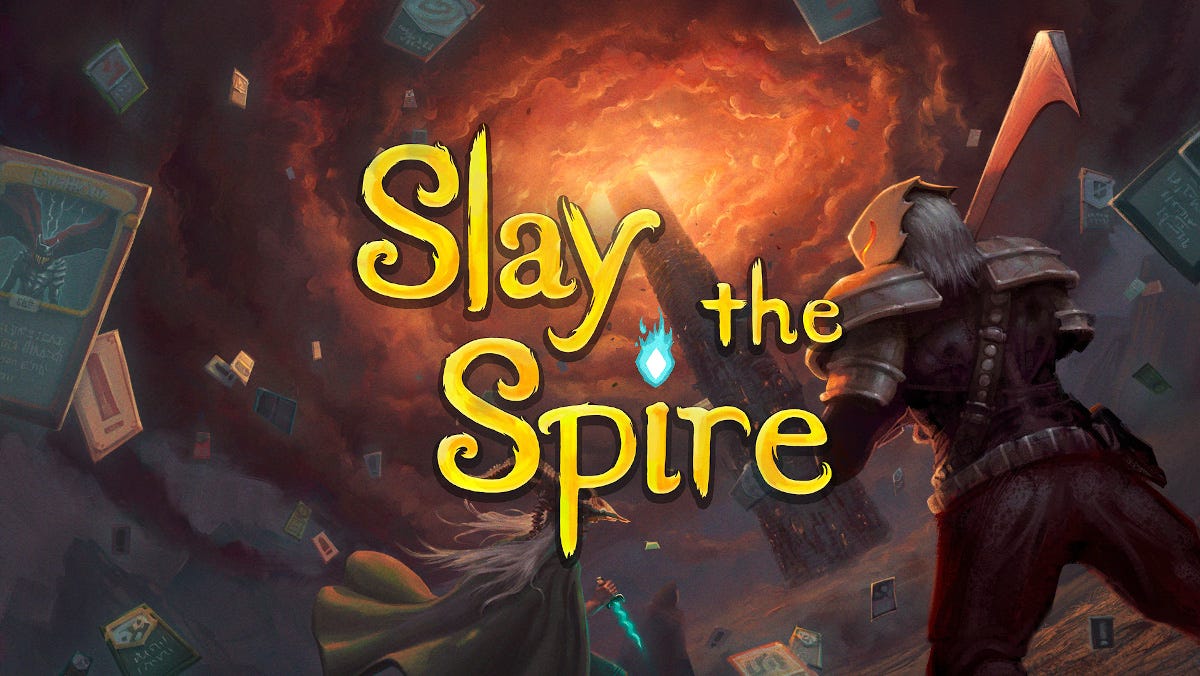SLAY THE SPIRE Defines Deckbuilder Games — For Better and Worse
Part game review, part retrospective on the genesis of a hybrid genre, part wHY WON'T YOU FUCKIN DIE ALREADY
Deckbuilder games seem to have collectively realized, at some point over the years since I first played Ascension on my phone, that they’re at their true potential in a roguelike format. Of the games I’ve played of this kind, SLAY THE SPIRE is by far the deepest, at times feeling like a nascent but full-fledged collectible card game — though it isn't safe from the typical pitfalls of its increasingly common genre hybrid.
On the odd chance that there are still any gaming enthsuiasts out there who remain unfamiliar with the sometimes contentiously specific "roguelike" premise, suffice to say the term has become a catch-all for games where you grind your way through randomized or semi-randomized dungeons or levels, each time encountering a cyclical variety of threats and rewards drawn from upward-scaling pools, resulting in highly varied and excitingly unpredictable scenarios and character builds. This perpetual tightrope walk between familiarity and novelty can, and often does, offer near-limitless replay value as you strive over and over and over and over to either get farther than you've ever gotten before, or to get to the end of a game's (or game mode's) predetermined number of levels with a climactic finish.
Pretty much all of this should sound familiar to players of more traditional collectible card games like Magic: The Gathering, where millions have long been acquainted with the intoxicating potential of limitless possibility within a reassuring range of constraints. And while there are plenty of games that apply the roguelike formula to all kinds of overlapping genres — from the fast-paced hack-and-slash / bullet hell / action-RPG genre pastiche of 2020's universally accoladed Hades, to the methodical, tactical, every-decision-counts turn-based gameplay of old-school titles like the one that gave the genre its name — as you might imagine, this approach meshes extremely well with card-based gameplay.
Over the course of at least the last five years, self-contained "deckbuilder" games — usually digital-first or digital-only card games focused on collecting and upgrading a new, different combination of cards over the course of each play session — have, organically, almost all evolved into roguelikes. This perfect marriage of genres has led to a rapid proliferation of variants on mobile, console, and PC alike.
It also just so happens that five years ago is, you guessed it, when Slay the Spire was released. So an alternative way to look at the game's widely recognized status as an exemplar of the genre is that it set the template on which most other roguelike decbuilders have been based — including both its many shining attributes, and its sometimes frustrating flaws.
If you’d like to read the rest of this game review / genre retrospective, this article stub has been a preview of the full piece over on Hipsters of the Coast. HotC is a great blog that I have a long history with, offering a variety of free coverage on a growing range of games, and I’m pleased to say I’ve returned to their roster of contributors. Going forward, much of my gaming-related writing will go there — with teaser stubs like this one here on EASY ANSWERS to make sure you don’t miss out.
SINISTRA BLACK is an LA-based writer-director, Transgender Anarchist killjoy, and Silent, Ironclad Defect Watcher.
She can be found on Twitter, Facebook Pages, and other platforms, sharing humor, criticism, scorching takes, and extra turns.
She is available for hire or deckbuilding advice, as long as you stopped following Magic in 2018.
For more…critical…criticism, check out Jessica Jones Season 1 Is Way More Racist Than You Remember. If podcasts are more your thing, try DEAD EYES: On Hating the Nicest Guy in the World. If neither, idk standup comedy i guess? jesus
All content © 2022 Sinistra Black, All Rights Reserved.
Images referenced under Fair Use.





